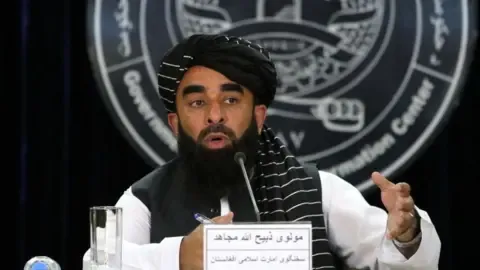In his Eid message released on Sunday, Taliban supreme leader Hibatullah Akhundzada claimed that his government has taken necessary steps to improve the lives of women in Afghanistan. Despite the fact that women are banned from public life and work, and girls’ education is severely curtailed, Akhundzada insisted that concrete measures have been taken to safeguard women’s rights and provide them with a comfortable and prosperous life in accordance with Islamic Shariah. His message was distributed in five languages, including Arabic, Dari, English, Pashto, and Urdu, highlighting the Taliban’s efforts to project themselves as a legitimate government.
Akhundzada, an Islamic scholar, rarely appears in public, and when he does, it is often surrounded by other religious scholars and allies who oppose education and work for women. His message stressed that under the Taliban’s rule, women are now protected from traditional oppressions, such as forced marriages, and that their Shariah rights have been respected. He also claimed that the Taliban has taken necessary steps to provide women with a comfortable and prosperous life.
However, the reality on the ground is far from Akhundzada’s claims. Lately, the Taliban has taken a stronger hand in directing domestic policy, banning girls’ education after the sixth grade and barring Afghan women from public life and work, especially in nongovernmental organizations and the United Nations. Despite initial promises of a more moderate rule, the Taliban has imposed harsh measures since seizing power in August 2021.

Hibatullah Akhundzada (Via Hibatullah Akhundzada/Twitter)
The international community has strongly criticized the Taliban’s treatment of women, and the country’s isolation has worsened a humanitarian crisis. Akhundzada’s message also condemned Israel’s behavior towards Palestinians and called on the people and government of Sudan to set aside their differences and work together for unity and brotherhood. The Taliban leader reiterated his call for other countries to stop interfering in Afghanistan’s internal affairs, insisting that his government wants good political and economic relations with the world, especially with Islamic countries.
The Taliban’s actions have sparked a fierce international uproar, with many countries condemning the group’s human rights abuses and restrictions on women. The economic collapse of the country has exacerbated the humanitarian crisis, leaving millions of people struggling to access basic necessities like food and healthcare. Despite Akhundzada’s claims, the reality is that women in Afghanistan are facing significant barriers to their rights and freedoms, and the international community should continue to pressure the Taliban to respect the rights of all Afghans, including women.
Through his message, Akhundzada is trying to project an image of the Taliban as a responsible and respectful government that is committed to the well-being of its people. However, his words are at odds with the harsh reality faced by Afghan women, who are struggling to survive under the Taliban’s rule. The international community must continue to scrutinize the Taliban’s actions and hold them accountable for their treatment of women and girls.











































